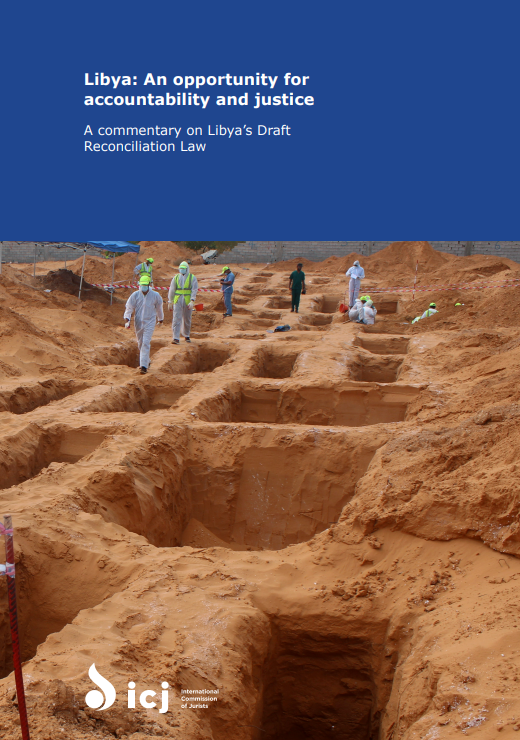In a new report, the International Commission of Jurists (ICJ) calls on the Libyan authorities to remedy remaining shortcomings and adopt Libya’s Presidential Council’s Draft Reconciliation Law with a view to ensuring full compliance with international human rights law and standards.
.هذا البيان الصحفي متوفر باللغة العربية أيضاً
“While concerns remain, especially regarding the lack of concrete safeguards ensuring the institutional independence of the Reconciliation Commission and other transitional justice mechanisms, the Draft Reconciliation Law’s adoption would bring about significant progress compared to Libya’s current transitional justice framework,” said Saïd Benarbia, ICJ Middle East and North Africa Programme Director.
A legal committee appointed by the Presidential Council (PC) started drafting a Reconciliation Law in late 2022 and finalized it in February 2024. In parallel, in January 2024, the House of Representatives (HoR) drafted an alternative Law on National Reconciliation, which fell short of elaborating a comprehensive process for transitional justice. Members of the HoR and of the PC’s legal committee met in May 2024 to combine both drafts into a single, comprehensive one, which is expected to be submitted to the HoR shortly.
In its report, the ICJ focuses its analysis on the PC’s Draft Reconciliation Law and formulates recommendations intended to enable the Libyan authorities and other stakeholders to establish an effective transitional justice framework and mechanisms.
The Libyan authorities should consider these recommendations with a view to adopting the PC’s Draft Reconciliation Law as a matter of urgency and ensuring that it is implemented in full compliance with international human rights law and standards.
In particular, the report calls on the Libyan legislators to:
- Ensure that the Chambers and Prosecution Office on Transitional Justice Cases, and the Reconciliation Commission be effectively competent, independent and impartial by setting out fair and transparent procedures, and objective criteria for the selection of its members;
- Ensure that Commission members were not involved in the commission of past human rights violations, including through the establishment and operationalization of an independent and adequate prior vetting process;
- Ensure that the Prosecution Office be able to instigate prosecutions not merely upon the Commission’s referral, but also proprio motu, based on the availability and admissibility of sufficient evidence to secure a conviction in a properly constituted court of law and on the notion that the public interest requires a prosecution;
- Ensure that the reports, including the historic report, the Truth Committee’s report and the Institutional Reform Committee’s report, be made public and appropriately disseminated;
- Overhaul the criminal procedure legal framework, including the Code of Criminal Procedure, with a view to establishing safeguards to guarantee compliance with international human rights law, before the Chambers start operating;
- Define the crimes under international law over which the Chambers are competent in line with and in reference to international law, including customary international law.
Contact
Said Benarbia, Director, ICJ Middle East and North Africa Programme; t: +41 22 979 3800, e: said.benarbia(a)icj.org.
Download

